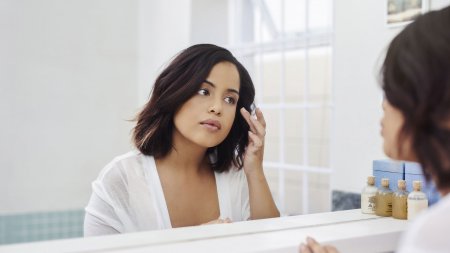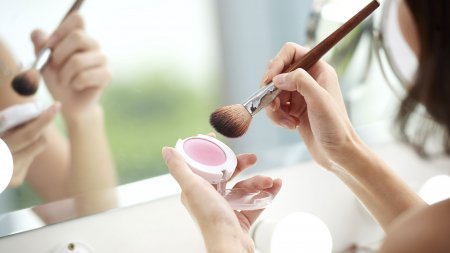Daily advice
How to clear acne? Discover the good habits & acne treatment to follow for acne-prone skin
Acne is a harmless skin disease, but all those who have experienced it know how much it can negatively impact their lives.

Daily advice
Acne is a harmless skin disease, but all those who have experienced it know how much it can negatively impact their lives.
What could be more annoying than getting up on the morning of an important meeting just to discover a new untimely spot on your face? It might not be serious, but it’s really quite upsetting!
A look at the causes of acne shows they are manifold: in reality, there isn’t just one reason that leads to acne, but a whole set of factors. Dermatologists thus describe it as a “multi-factorial disease”.
The good news is that, besides taking medical treatments, acne sufferers can take steps in their everyday lives to combat spots and blackheads. All they need to do is follow some simple recommendations for acne-prone skin: here we provide key information about make-up removal, hygiene and skincare advice, good make-up habits, the impact of lifestyle, and how to avoid acne scars.
Make-up removal is THE key to proper cleansing for acne-prone skin. The aim is to allow sebum to flow freely and keep pores from becoming blocked. Indeed, sebum production is the first focus if you want to get rid of oily skin & prevent acne.
Girls who wear make-up absolutely must thoroughly remove it every evening to eliminate all traces of cosmetic products from the epidermis. Those who don’t wear make-up also need to cleanse their skin properly to prevent bacterial proliferation and the inflammatory effects of pollution.
With acne, the challenge lies in striking the right balance between efficacy and preservation of the epidermis, since acne-prone skin can be sensitive and rapidly react to certain make-up products.
You must cleanse the skin without attacking or damaging it, which could end up leading to excess sebum production.
Typically, overly vigorous make-up removal alters the skin’s protective hydrolipidic film, which preserves its physiological acidic pH. To ensure effective and risk-free cleansing, choose a purifying cleansing gel or a micellar water that purifies the skin without drying it.
More than any other skin type, blemished skin reacts to internal and external pollution factors.
“The starting point for healthy skin is, therefore, regular cleansing, in the morning and evening”.
In the evening, thoroughly cleansing the skin helps optimise natural overnight skin regeneration since the epidermis is particularly active during the night.
In the morning, cleansing rids the skin of metabolic residues (dead skin, sweat, sebum, etc.).
As with make-up removal, the products used should combine efficacy and preservation of the skin’s protective hydrolipidic film. People prone to acne absolutely must avoid abrasive products that strip the skin. Similarly, scrubs, which are beneficial in the event of blackheads due to their keratolytic action, can have negative effects. Use them in moderation or opt for a gentle home peel!

Moreover, acne-prone skin requires medicated treatments (keratolytic, antibacterial, anti-inflammatory, astringent, deep-cleansing, etc.) specifically tailored to the type of acne.
Even when topical treatment has been prescribed by a doctor, hydration remains necessary, since most of these treatments tend to dry out the skin. Targeted moisturising products are currently available for all the needs of acne-prone skin, including dilated pores, inflamed red spots, blackheads and inflammatory cysts. BIODERMA has developed an ultra-moisturising compensating care for people under acne-treatment. The Sébium Hydra nourishes and intensively rehydrates the skin for a better compliance of ultra-drying treatments.
The last tip you absolutely must follow if you have acne is to not touch, pop or handle your spots, however tempting it may be. First of all, it will only make the situation worse and cause your spots to become more visible. In addition, all forms of picking and squeezing will sharply increase the risk of scarring.
Make-up can save the lives of girls dealing with acne: they shouldn’t hesitate to use a BB cream, concealer or foundation to cover up their blemishes. That said, they should choose their products with great care, especially for face make-up. Any high-coverage product with an occlusive effect could worsen their lesions.
There are also some ingredients that can cause spots to form, which is why it’s important to verify that products are “non-comedogenic” – this information can usually be found on the label. The overuse of unsuitable cosmetic products can lead to a condition currently known as “acne cosmetica”.
Anti-dark circle products and concealers are very effective at covering up localised blemishes and reducing redness. There are also tinted creams, or BB creams, specifically formulated to conceal and treat acne in one easy step.
Of course, make-up removal every evening is essential. As for brushes, sponges and make-up tools, they also need to be cleaned with soapy water on a regular basis to prevent bacterial growth. If you apply your foundation with your fingers, wash your hands thoroughly beforehand.

Many other aspects of everyday life can have a more or less significant and sometimes scientifically proven impact on acne.

Smoking
Smoking is known to aggravate skin problems in general and has been accused of thickening the skin and making it appear dull. Although no direct connection to blemishes has been established, it is strongly suspected of having a negative effect on acne lesions.

The sun
The sun is directly responsible for a rebound effect well known to dermatologists, who warn acne patients about the risks run every summer. The sun starts by drying out spots and thus seems to improve the condition of the skin at first, but it’s not! UV rays actually thicken the epidermis, which tends to clog the pilosebaceous follicles and thus promote sebum retention beneath the skin, in a period – the summer – when sebum production is at its peak. It’s like a ticking time bomb! This accumulation of sebum provides an ideal environment for the proliferation of Cutibacterium acnes, leading to the famous rebound effect, experienced by countless acne patients at the end of the summer. The solution? Avoid exposing your facial skin to UV rays and don’t go out in the sun without applying specific sun protection for oily acne-prone skin.

Diet
In terms of diet, certain foods such as chocolate and cured meats have long been accused of playing a role in acne, although there has not been sufficient scientific evidence so far. Recent studies on this topic seem to show the impact of dairy products, especially those that are low in fat. Greasy junk food and excess sugar intakes are known for their overall pro-inflammatory effects, which are bad for health in general and the skin in particular. Nutritional advice for acne is, therefore, the same as for body weight and ageing: avoid processed foods and favour fresh fruits and vegetables as well as homemade meals.

The birth control pill
The birth control pill can improve acne-prone skin if chosen wisely, with an appropriate hormonal balance. But it is not a treatment in itself. Some types of pills can have the opposite effect and make acne even worse. You should therefore speak with your gynaecologist to find the best strategy.

Mobile phones
The bacteria on your mobile phone come into contact with your cheek all day long – you should therefore remember to clean it thoroughly, several times a week, and use earphones whenever possible!

Shaving
Promoting irritation and the inflammation of lesions, shaving can be very uncomfortable, especially if you’re using an aggressive treatment that weakens the skin. In that case, it’s best to shave just once every two or three days, depending on your tolerance threshold.
Scarring is the most common complication of acne, an otherwise harmless skin disease, except in extreme cases. It’s hard to know what types of skin and what types of lesions can lead to scarring. However, there are some steps you can take to prevent and also correct acne scars.
Two simple tips:
Once scars are present, various techniques – peels, lasers, injections, etc. – are available to eliminate them or at least make them less visible. All these methods should preferably be implemented under medical supervision, although they can also be performed by certain beauticians. The choice of technique depends on the type of scar, and procedures can only be carried out once acne is fully healed.